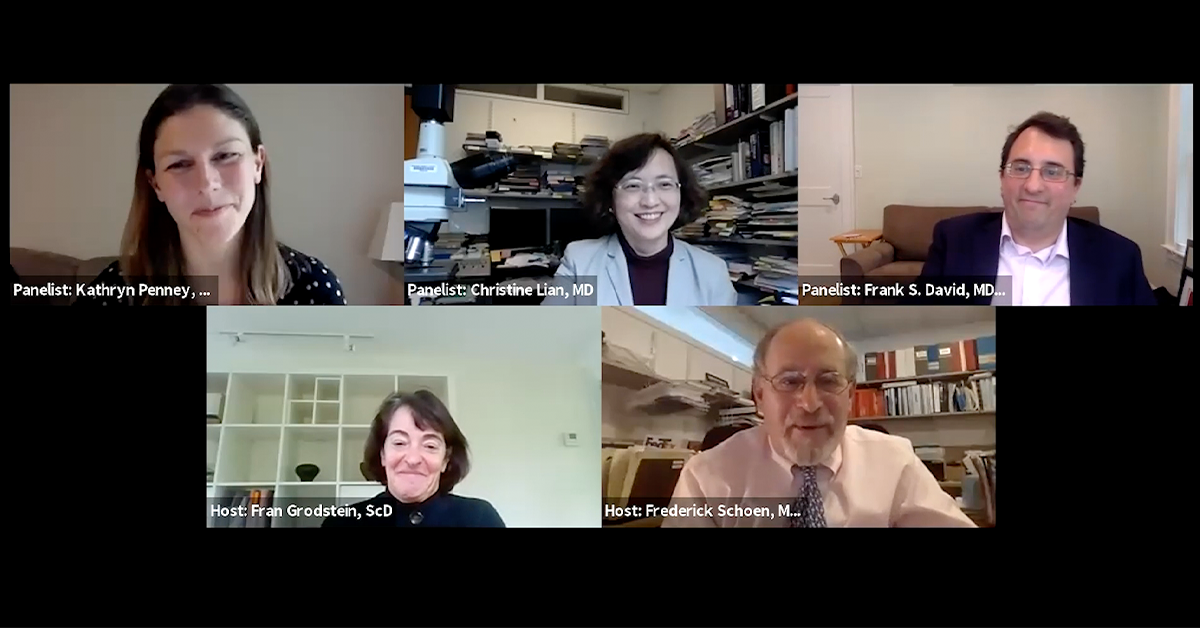News & Highlights
Topics: Clinical & Translational Research, Education & Training, Mentoring, Technology
Building a Successful C/T Research Career
Webinar series trains aspiring clinical and translational researchers in communications, leadership, and mentoring.

“There’s no denying we are in unusual times. It’s our duty as educators and facilitators to continue providing educational resources during the challenging circumstances we are facing,” said Elliott Antman, MD, who serves as the director of Harvard Catalyst’s Postgraduate Education program.
On May 29, Antman introduced a virtual webinar series that was launched in response to the postponement of in-person courses due to the current pandemic. The recent series, “Building a Successful C/T Research Career,” invited participants this past April through May to learn from leading Harvard faculty and community members the foundational skills to build a successful career in clinical and translational (c/t) research. These include, among others, communication, leadership, and mentoring.
“It’s our duty as educators and facilitators to continue providing educational resources during the challenging circumstances we are facing.”
Incorporating content from popular in-person courses such as “Effectively Communicating Research” and “Leadership Strategies for the Researcher,” the series offered researchers around the world the chance to continue to advance their skills remotely.
“Content for this series is based on the topics and themes that we consider to be foundational in cultivating the cross-cutting skills of the successful clinical and translational researcher,” further explained Frederick Schoen, MD, PhD, director of Harvard Catalyst’s Mentoring program.
Topics and themes throughout the series included, how to publish a scientific paper, slide design, honing research talks, negotiating, giving and receiving feedback, working in teams, and mentoring relationships. Through a series of workshop-based activities and question and answer segments, more than 1,400 participants learned from leading experts in their respective fields, including Melissa Marshall of Present Your Science, Jonathan Rosenbluth, JD, of Triad Consulting Group, Mary Shapiro, MBA, of Simmons University, and Fran Grodstein, ScD, of Rush University.
Rounding out the series with a focus on c/t career paths, the last webinar, “Strategies for Navigating Career Transitions,” brought together a panel of three mid-career scientists both in academia and industry to share their perspectives on challenges they’ve faced and key factors that influenced their decision making along the way.
Frank David, MD, PhD, of Pharmagellan, explained his transition from research to industry, which led him to eventually start his own biotech consulting firm. Christine Lian, MD, a physician scientist at Brigham and Women’s Hospital, provided insight into her unique position which requires that she balance both clinical and other research demands. Kathryn Penney, ScD, Brigham and Women’s Hospital, discussed her focus as, “pretty much 100% research,” and her responsibility to bring in grants to support her work and career, a universal requirement for researchers.
The importance of networking, self-discovery, and work-life balance was stressed throughout the webinar. “Building relationships is key,” said David.
“Content for this series is based on the topics and themes that we consider to be foundational in cultivating the cross-cutting skills of the successful clinical and translational researcher.”
“I started with three people I knew and continued to branch out. I was trying to make a mental map of what else there was out there. I asked them for recommendations of other people who had made this transition,” he said, explaining the vital role networking played in his career change.
Addressing work-life balance, Penney emphasized, “There are times in your life when your priorities may change and you may want to do something different, and I think being open to that type of change and embracing that change in order to keep balance in your life is important.” You have to think about, “how do you want to be spending your time?” Many researchers have children and spouses, “I work hard and then I come home and enjoy spending time with my family.”
You never know where an opportunity will take you, or what you’ll learn about yourself. You need to, “be flexible and take advantage of opportunities that may be outside your area,” said Penney.
“Everything you do helps. Nothing is wasted,” chimed in David, highlighting the importance of seeking new challenges and roles.
The reality that most careers aren’t linear was recognized by all three panelists. Everyone’s career path is unique. “Although my path is not linear and has zig zagged, everything I did has contributed to what I’m doing now, ” said Lian.
Sometimes you don’t end up where you think you will. “Some careers are truly not linear. I started off as an engineer and my first job in industry allowed me to work on medical products, and that led me to the idea of going to medical school,” added moderator Fred Schoen.
Harvard Catalyst Postgraduate Education program will continue to find innovative ways to provide distance learning opportunities to clinical and translation researchers. “Given the pandemic and ongoing suspension of in-person courses, we’ll continue to develop new remote training,” said Schoen as he concluded the series.
“The series was extremely well received, and it’s a format that undoubtedly added to our repertoire of educational resources,” said Erica Lawlor, director of Harvard Catalyst’s Postgraduate Education program. This was, she continued, “an opportunity for us to broaden access for learning critical skills necessary to build a successful c/t research career, especially in a time when productivity for young investigators has been otherwise limited. Building upon its success. You can expect an exciting new series to launch this fall.”

